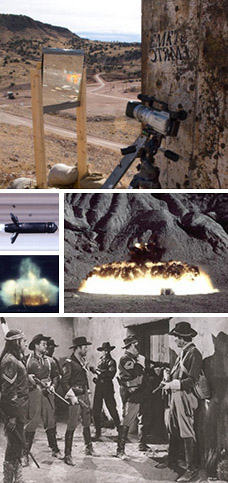
on for what seemed a whole minute but was actually one or two s
econds. The white ball grew and after a few seconds became clouded with dust whipped up by the explosion from the ground and rose and left behind a black trail of dust particles." Joe McKibben, another scientist, said, "We had a lot of flood lights on for taking movies of the control panel. When the bomb went off, the lights were dro
wned out by the big light coming in through the open door in the back." Others were impressed by the heat they immediately felt. Military policeman Davis said, "The heat was like opening up an oven door, even at 10 miles." Dr. Phillip Morrison said, "Suddenly, not only was there a bright
light but where we were, 10 miles away, there was the heat of the sun on our faces .... Then, only minutes later, the real sun rose and again you felt the same heat to the face from the sunrise. So we saw two sunrises." Visitors sometimes ask about soldiers watching the test from trenches. That took place during tests in Nevada, not at Trinity Site. Personnel were at least 10,000 yards from ground zero and they were in bunkers. The test was conducted to see if the bomb would work and to measure its yield. ( After the explosion ) Althou
gh no information on
- the test was released untEMRTC
- il after the atomic bomb was used as a weapon against Japan, people in New
- Mexico knew something had happened. The shock wave broke wi
- Mr. Marvin Banksndows 120 miles away and wa
- s felt by many at least 160 miles away. Army off
- icials simply s, Ordnance Supervisor, tated
- that a munitions , Research Engineer, stora
- ge area had exploded at the Alamogor
do Bombing Ran
- ge. The explosion did not make much of a crater. It was about four feet de
- ep and 240 feet , Former Director, Aerojet Operations
Course Dates
- in diamter. Most
- eyewitnesses de
Registration Information
Contact Information
as more of a small depression
instead of a distinct crater.
The heat of the blast vaporized
the steel
t
ower and melted the d
esert sand and
turned
it into a
green glassy subst
Fax: 575.835.5680
ance. It was
called Trinitite a
nd small pieces c
an still be seen in the area. At one time Trinitite covered much of the depression made by the explosion. Afterwards the depression was filled and much of the Trinitite was taken away by the Atomic Energy Commission. To the west of or by contacting Dana Stocks at the monument is a low structure which is protecting an

